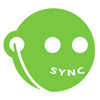May 25, 2013
by Traci Gardner
 If you like audiobooks, check out the free young adult audiobook downloads from Sync YA Audiobooks. It’s 24 books–two each week starting on May 30.
If you like audiobooks, check out the free young adult audiobook downloads from Sync YA Audiobooks. It’s 24 books–two each week starting on May 30.
I’ve downloaded these books the past two summers, and they are excellent books each year. It’s a great way to build your audiobook library. Each week, they post one recent title, and one classic text that explores similar themes. For example, the first week, they are pairing Of Poseidon by Anna Banks, read by Rebecca Gibel (AudioGO) with The Tempest by William Shakespeare, read by a Full Cast (AudioGO). So even if you aren’t working with teens (or don’t have teens at home), you may find the classics each week worth downloading.
Get more info on their website and check out the Tool Kit for posters, bookmarks, and other graphics that you can download to spread the word about the books.
There’s a linked version of the full schedule on the site, but to
get you excited, I’ve pasted it in below too:
May 30 — June 5, 2013
Of Poseidon by Anna Banks, read by Rebecca Gibel (AudioGO)
The Tempest by William Shakespeare, read by a Full Cast (AudioGO)
June 6 — June 12, 2013
The Incorrigible Children of Ashton Place, Book 1: The Mysterious Howling by
Maryrose Wood, read by Katherine Kellgren (HarperAudio)
Jane Eyre by Charlotte Brontë, read by Wanda McCaddon (Tantor Audio)
June 13 — June 19, 2013
The Raven Boys by Maggie Stiefvater, read by Will Patton (Scholastic
Audiobooks)
Bless Me, Ultima by Rudolfo Anaya, read by Robert Ramirez (Recorded Books)
June 20 — June 26, 2013
Once by Morris Gleitzman, read by Morris Gleitzman (Bolinda Audio)
Letter From Birmingham Jail by Martin Luther King, Jr., read by Dion Graham
(christianaudio)
June 27 — July 3, 2013
Rotters by Daniel Kraus, read by Kirby Heyborne (Listening Library)
Frankenstein by Mary Shelley, read by Jim Weiss (Listening Library)
July 4 — July 10, 2013
Carter Finally Gets It by Brent Crawford, read by Nick Podehl (Brilliance
Audio)
She Stoops to Conquer by Oliver Goldsmith, read by a Full Cast (L.A. Theatre
Works)
July 11 — July 17, 2013
The Peculiar by Stefan Bachmann, read by Peter Altschuler (HarperAudio)
Oliver Twist by Charles Dickens, read by Simon Vance (Tantor Audio)
July 18 — July 24, 2013
Grave Mercy by Robin LaFevers, read by Erin Moon (Recorded Books)
Hamlet by William Shakespeare, read by a Full Cast (L.A. Theatre Works)
July 25 — July 31, 2013
The False Prince by Jennifer A. Nielsen, read by Charlie McWade (Scholastic
Audiobooks)
The Prince and the Pauper by Mark Twain, read by Steve West (Blackstone
Audio)
Aug 1 — Aug 7, 2013
Death Cloud by Andrew Lane, read by Dan Weyman (Macmillan Audio)
The Adventures of Sherlock Holmes by Arthur Conan Doyle, read by Ralph
Cosham (Blackstone Audio)
Aug 8 — Aug 14, 2013
Enchanted by Alethea Kontis, read by Katherine Kellgren (Brilliance Audio)
Through the Looking Glass by Lewis Carroll, read by Miriam Margolyes
(Bolinda Audio)
Aug 15 — Aug 21, 2013
Sold by Patricia McCormick, read by Justine Eyre (Tantor Audio)
Let Me Stand Alone by Rachel Corrie, read by Tavia Gilbert (Blackstone
Audio)
 I’m befuddled by this MLA call for proposals for a volume on the Changing Role of Writing in Composition.
I’m befuddled by this MLA call for proposals for a volume on the Changing Role of Writing in Composition.




